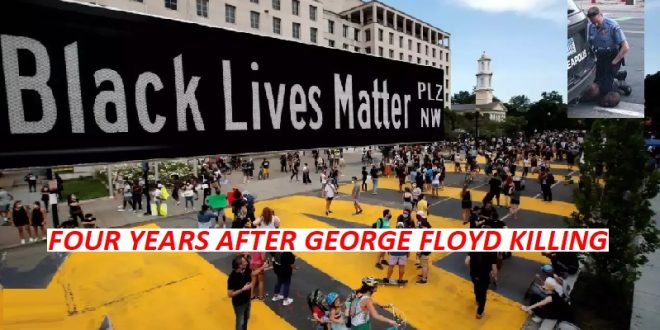27-05-2024
WASHINGTON/ MINNEAPOLIS: Four years after George Floyd was murdered by a Minneapolis police officer, momentum in Washington to pass sweeping reform in the Minnesota man’s name has almost faded away completely.
 The death of Floyd, a 46-year-old Black man, in May 2020 sparked outrage and calls for change. Sensing the deep anger across the United States, Democrats and Republicans in Congress put forward different bills in response less than a month after he was killed but as more time passes since a police officer kneeling on Floyd’s neck for more than nine minutes shocked the nation, there’s been little urgency about making the kind of sweeping changes that President Biden has wanted to see.
The death of Floyd, a 46-year-old Black man, in May 2020 sparked outrage and calls for change. Sensing the deep anger across the United States, Democrats and Republicans in Congress put forward different bills in response less than a month after he was killed but as more time passes since a police officer kneeling on Floyd’s neck for more than nine minutes shocked the nation, there’s been little urgency about making the kind of sweeping changes that President Biden has wanted to see.
“That’s the insult right there, not taking action,” Keeta Floyd, George’s sister-in-law, said.
What happens on the issue moving forward could be decided by the 2024 elections as Biden contends with the prospect of his support softening with Black voters who are key to his effort to win the White House once more.
There have been killings by police in the years since Floyd’s death, including in early 2023 when Tyre Nichols, a 29-year-old Black man, died in Tennessee. Not long after, South Carolina Republican Sen. Tim Scott gave a speech faulting Democrats and politics for a lack of progress.
Scott, the only Black Republican in the Senate, was the lead GOP negotiator on police reform and had authored a bill of his own after Floyd’s death that was blocked by Senate Democrats at a time when many in their party supported a farther-reaching effort of their own.
“I hope that when the dust settles, and the issue is no longer on the front pages of our newspapers, no longer streaming across our TVs and our iPads and our computers, that we do something that says to the American people, we see your pain, we are willing to put our partisan labels and shirts and uniforms on the side, so that we can do what needs to be done,” Scott said in his speech last year.
 Less than a year and a half later, Scott is viewed as a potential running mate for presumptive Republican presidential nominee Donald Trump. Scott’s office declined interview requests about the struggle to pass policing changes in Congress.
Less than a year and a half later, Scott is viewed as a potential running mate for presumptive Republican presidential nominee Donald Trump. Scott’s office declined interview requests about the struggle to pass policing changes in Congress.
Biden made addressing the stark issues brought to light by Floyd’s murder a focus of his 2020 presidential campaign. While Republicans and Democrats rallied behind separate bills in the weeks after Floyd was killed, no efforts came close to becoming law with Republican Donald Trump in the White House. Early in his presidency when Biden addressed Congress for the first time, he used one of the biggest speeches of his life to call on Congress to finally find a path forward and quickly.
“We need to work together to find a consensus,” Biden said in April of 2021 “but let’s get it done next month, by the first anniversary of George Floyd’s death.”
Despite bipartisan negotiations, Congress failed to meet the president’s timeline and a few months later, the talks fell apart. Overhauling qualified immunity, which can protect law enforcement from civil lawsuits, was an issue Democrats cared deeply about but was strongly opposed by the GOP.
Since then, attention on the issue in Congress has waned considerably. Republicans, in an attempt to portray themselves as the party of law and order, have continued to try and associate Democrats with the politically volatile “defund the police” slogan that was prominent after Floyd was killed, even though most congressional Democrats do not support that movement.
The lack of action in Congress has come amid concerns about crime and worries about recruitment and staffing shortages for law enforcement during Biden’s time in office. (Int’l News Desk)
 Pressmediaofindia
Pressmediaofindia




